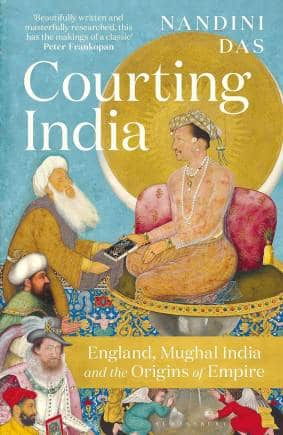



Convergence and divergence of national interests and commercial interests has always been a globally important issue, but in recent times it has assumed even greater significance. The film Tetris, released last year, told us the story of how at the height of the Cold War, a promising video game was being blocked in the US simply because a Russian came up with it. India, of course, has banned certain Chinese apps and businesses citing national security. But our national encounter with ‘mercantile imperialism’ began all the way back in the 1610s, with the arrival of Thomas Roe, the first-ever royal British ambassador to set foot in India — as Nandini Das’s debut work of nonfiction Courting India (Bloomsbury) tells us. Das is a professor of English at Oxford University, and last week, her book won a British Academy Book Prize.
 Bloomsbury, 480 pages, Rs 599
Bloomsbury, 480 pages, Rs 599
Courting India is primarily a feat of archival work. Das uses Roe’s extensive records and journals to paint a vivid picture of early 17th century India, taking care to inform the reader about what every new character introduced means to the complex power hierarchies being negotiated by Roe, who would go on to visit the Mughal emperor Jehangir’s court. As the ambassador, Roe was answerable to England's King James I — but beyond that, his loyalties were fluid and this is apparent in Roe’s accounts as well, as Das points out.
“It (the account) is also shaped by his sense of the differing priorities of his many readers, from his king and the Company, to the English traders in India and his courtly friends at home. He is conscious always of what they might expect – both of India, and of him. History is as much about the stories we tell as it is about the events it records, and in that sense Roe’s account is a perfect illustration of history in the making: of events being recorded and retold, others being silenced and erased, and that process happening repeatedly, at different times and driven by different imperatives in later retellings.”
As that paragraph shows, this is by no means a conventionally written, straight-lines history book. On the contrary, this is book with literary flair that takes its assignment seriously. Das is not only a solid sentence-by-sentence writer, she is also ever-aware of where the larger narrative is leading. Roe’s India years—1615 to 1619—are momentous, she is telling us, but not for the reasons you'd think. For starters, the Mughals barely took him seriously at first, and this contempt is at odds with the popular image of Mughal rulers in India. Then there’s the line that Roe took with Indian rulers as a whole. He said that imperial expansionism was against both Indian and British interests, that the Empire’s interests in India were purely commercial.
Why did Roe take this line, one might ask. As the book’s midsection shows us, Roe’s motivations had less to do with the nature of Indian kingdoms than the state of the Empire itself, with its many fractures and divisions. A call for flat-out war (even a potentially lucrative one) on the other side of the world would not necessarily have been popular. Das hints at this in the introduction itself:
“As James I’s ambassador, Thomas Roe was representing a kingdom that was beset by inner strife and financial woes, and deeply conflicted about being identified as a single entity, a unified ‘Great Britain’. Britain’s imperial destiny at this moment may have been dreamt of by some, but it was by no means certain. Instead, Roe’s negotiations unfold against the chiaroscuro of a glittering court and its scandals, deep-set fractures within its political structures, and the beginnings of a cycle of trade and consumerism that devoured all things new and exotic and transformed society in the process.”
Courting India is an enjoyable read. The scholarship and research that went into the book are impeccable. But what’s even more impressive is the way in which Das allows you to fully inhabit the skin of a British man who has been dead for more than 400 years — and she does so without any facile calls to “root for” the man in question. We are not rooting for Roe, but we are deeply invested in his fate. We are exasperated at his refusal to learn Indian languages, as we are amused at his staff’s clumsy attempts at integration, and horrified when on day one of his arrival, his personal cook picks a fight with a Mughal nobleman.
With Roe’s arrival, colonialism was just a hop, skip and jump away for most Indians — only we didn’t know it yet.
Discover the latest Business News, Sensex, and Nifty updates. Obtain Personal Finance insights, tax queries, and expert opinions on Moneycontrol or download the Moneycontrol App to stay updated!
Find the best of Al News in one place, specially curated for you every weekend.
Stay on top of the latest tech trends and biggest startup news.